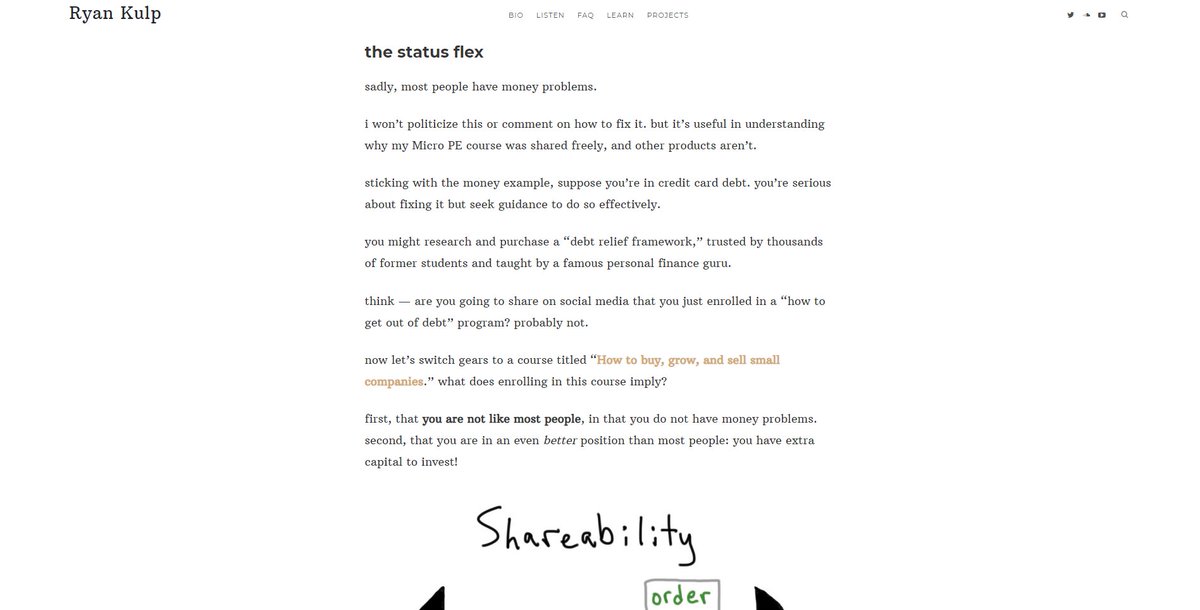✅ 0 - 10 customers
✅ 10 - 100 customers
✅ 100 - 1,000 customers
⏳ 1,000 - 10,000 customers
I made it to 1,000 customers mostly with short-term sales tactics, and if you're micro-SaaS, maybe you can too
(thread 👇)
✅ 10 - 100 customers
✅ 100 - 1,000 customers
⏳ 1,000 - 10,000 customers
I made it to 1,000 customers mostly with short-term sales tactics, and if you're micro-SaaS, maybe you can too
(thread 👇)
https://twitter.com/_rchase_/status/1049794689690406912
Here's the short-term vs. long-term marketing strategies in the article above which we're using today (at 1,082 subscribers)
I put a 🤔 next to things I used to do personally until I hired. Now we both do them manually. Not sure if that counts as short or long-term strategy?
I put a 🤔 next to things I used to do personally until I hired. Now we both do them manually. Not sure if that counts as short or long-term strategy?

You can see the only long-term plan listed there that we're using is SEO... and by SEO I mean we're in such a small niche that we landed top result for most related search terms ~6months after launching and have held it since, without any effort on our part like blogging 

In this thread, I revealed most of my marketing strategies for finding new customers. Other than affiliate marketing or FB group sponsorship, they're not very scalable. They're very "short-term" sales methods
https://twitter.com/_rchase_/status/1255211082983124992?s=20
Even with seemingly long-term strategies like SEO, affiliate marketing, and FB group sponsorships, I've never developed a truly scalable marketing system - the kind where I can put more money down or people on it and it reliably outputs X dollars for every X dollar I put in. 

I'm always envious of businesses that found that gas pedal, or have built-in virality like "Powered by" links or chat apps where new users are mainly acquired by existing users... 

But the one thing I've found that can impact the viral coefficient for my business is actually related to a "short-term"/ difficult to scale strategy:
Telling my story, meeting one IT business owner at a time, giving away some of my best tricks, free UniFi advice/ support
Telling my story, meeting one IT business owner at a time, giving away some of my best tricks, free UniFi advice/ support

I've met with hundreds of business owners to do demos over Zoom, helped thousands of people with Ubiquiti stuff in live chats, screenshare, and on the phone
https://twitter.com/_rchase_/status/1266058279878262788?s=20
It's not just our own customers or leads, I also regularly jump on a call or Zoom if I see I can help anyone out with a Ubiquiti related issue. Anyone can book me calendly.com/reillychase
"When referred by a friend, people are 4x more likely to purchase"
The 'one weird trick' I found for getting referrals is building legitimate relationships, one at a time
Everyday I'm making friends with the right people - IT business owners and people who serve them
The 'one weird trick' I found for getting referrals is building legitimate relationships, one at a time
Everyday I'm making friends with the right people - IT business owners and people who serve them

How do I build legitimate relationships with people I want to sell to or I want to refer for me?
Just like any other - by discussing shared interests. In my case, almost all of my customers and I have shared interests in at least 2 things - #Ubiquiti and entrepreneurship
Just like any other - by discussing shared interests. In my case, almost all of my customers and I have shared interests in at least 2 things - #Ubiquiti and entrepreneurship

I don't have the typical "refer a friend and get X" program, currently we don't incentivize referrals at all actually, and our affiliate program is invite-only. I don't even ask for referrals. Yet somehow our growth is heavily referral driven... 

Why do people refer is a complicated question, but I love @ryanckulp's blog post "Anatomy of Referral Marketing" on the subject, good read if you want to really optimize for it: ryanckulp.com/anatomy-of-ref…
I'd rate @hostifi_net as right in the middle on quality paradox, polymath, and shareability though. Sharing your new UniFi hosting provider is not a "look at me I'm smart and rich" thing like sharing that you bought a Micro Acquisitions course can be... 

But also: "People do business with people they know, like, and trust"
I bought Ryan's course for those reasons, and I recommended it because it was good and it can be useful for others (and with no affiliate link because that's not my style)
I bought Ryan's course for those reasons, and I recommended it because it was good and it can be useful for others (and with no affiliate link because that's not my style)
https://twitter.com/_rchase_/status/1223412783351504898?s=20
People only get to know, like, or trust you when they've seen you around others, met with, or talked to you directly, over time.
That happens by growing your personal and professional networks slowly, intentionally, one person at a time. Transparency, building in public helps.
That happens by growing your personal and professional networks slowly, intentionally, one person at a time. Transparency, building in public helps.

See also: Rule of 7
"...one of the oldest concepts in marketing. The rule of seven simply says that the prospective buyer should hear or see the marketing message at least seven times before they buy it from you."
"...one of the oldest concepts in marketing. The rule of seven simply says that the prospective buyer should hear or see the marketing message at least seven times before they buy it from you."

Reciprocity Marketing
Another factor that drives referrals in my business is the reciprocity concept. That is, when you do something big for someone and expect nothing in return, they naturally want to find a way to pay it back.
Another factor that drives referrals in my business is the reciprocity concept. That is, when you do something big for someone and expect nothing in return, they naturally want to find a way to pay it back.

When we help people with Ubiquiti stuff for free we're planting reciprocity marketing seeds. Even if that person never becomes a customer, they might refer someone who does. I try to help as many people as I can whether they are a "good lead" or not.
https://twitter.com/_rchase_/status/1288829826829357056?s=20
Maybe one of these days I'm going to find that gas-pedal, and build a marketing machine that I can deploy capital into and get a higher return out of. But for now I'm sticking with my things that don't scale. It might be hard, slow, work, but at least it's free? 🤔 

• • •
Missing some Tweet in this thread? You can try to
force a refresh












